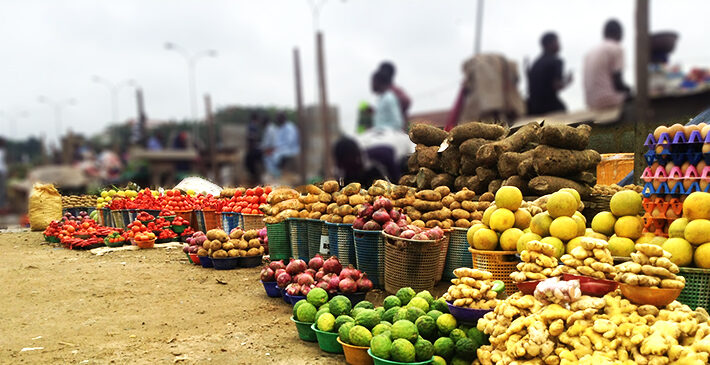The Centre for the Promotion of Private Enterprise (CPPE) has cautioned that the recent moderation in Nigeria’s headline inflation could be undermined by persistent hikes in food prices, which continue to exert pressure on household incomes and worsen poverty levels.
Director of CPPE, Dr. Muda Yusuf, made this known in a statement on Friday, noting that while the National Bureau of Statistics (NBS) reported a slowdown in headline inflation to 21.88 percent in July, the underlying reality remains challenging for many Nigerians as food remains the dominant component of household spending.

According to Yusuf, food inflation has remained sticky and continues to pose a threat to overall price stability. “The numbers may suggest some level of easing, but the lived experiences of millions of households tell a different story. Food accounts for over 50 percent of Nigeria’s consumer price index basket, which means that any persistent surge in food prices has a significant impact on the overall welfare of citizens,” he explained.
He noted that the moderation in headline inflation was largely driven by base effects and statistical adjustments rather than fundamental improvements in supply-side conditions. Issues such as insecurity in farming communities, poor logistics, rising transport costs, and exchange rate depreciation continue to push food prices higher, he said.
The CPPE boss stressed that while the Central Bank of Nigeria (CBN) has tightened monetary policy through higher interest rates, such measures alone cannot resolve inflationary pressures that are largely supply-driven. “The problem is not just about money supply or credit conditions, but more about structural bottlenecks in the agricultural value chain. Unless these are addressed, Nigerians will continue to face escalating food costs despite any statistical slowdown in inflation,” Yusuf added.
He further warned that the spike in staple food items, including rice, maize, beans, garri, tomatoes, and onions, has continued to strain low-income households. Many families, he noted, have been forced to cut back on protein consumption and other essential nutrients, heightening concerns over malnutrition and health challenges.
The CPPE recommended that government intensify efforts to support food production by addressing insecurity in farming regions, boosting mechanisation, improving access to inputs, and rehabilitating rural infrastructure. “Farmers are increasingly abandoning their farmlands due to kidnappings, banditry, and herder-farmer clashes. This has contributed significantly to food shortages. Tackling insecurity must therefore be at the top of the agenda if Nigeria wants to stabilise food prices,” Yusuf said.
He also emphasised the need to expand investments in storage facilities and cold-chain logistics to reduce post-harvest losses, which account for as much as 40 percent of some agricultural produce. Improving road networks and transport systems, he said, would also help reduce the cost of moving food from farms to markets.
The CPPE further called for targeted fiscal incentives for agro-allied businesses, noting that food processing and value addition remain critical to ensuring stability in supply. “Supporting agribusinesses with tax reliefs, lower import duties on farm equipment, and access to affordable credit would enhance productivity and help bring down food prices in the medium term,” Yusuf stated.
Beyond agriculture, the CPPE boss also highlighted the role of foreign exchange volatility in driving food inflation, especially for imported food items and agricultural inputs. The depreciation of the naira, he noted, has increased the cost of imports ranging from wheat and fertiliser to poultry feed, which in turn filters into consumer prices.
He therefore urged government to intensify reforms in the foreign exchange market to stabilise the naira and ensure more predictable access to forex for legitimate businesses. “Without tackling exchange rate volatility, the problem of imported inflation will persist,” he cautioned.
Yusuf also called on policymakers to strengthen social protection programmes to cushion the impact of food inflation on vulnerable households. Initiatives such as targeted cash transfers, school feeding programmes, and subsidised farm inputs, he said, would help mitigate the immediate pain for Nigerians while longer-term solutions are being implemented.
Industry analysts echoed CPPE’s warning, noting that while the slowdown in headline inflation is a welcome development, Nigeria’s inflation problem is far from solved. They pointed out that the food component of inflation remains a far more pressing concern for ordinary citizens, many of whom spend as much as 60 to 70 percent of their income on feeding.
Economists also noted that persistent food inflation could undermine government’s poverty reduction strategies, as rising food costs erode real incomes and widen inequality. The World Bank has consistently warned that inflationary pressures in Nigeria disproportionately affect the poor and could push millions more into extreme poverty if not addressed urgently.
The CPPE insisted that the solution lies in a multi-pronged approach that combines macroeconomic stability with structural reforms in agriculture and logistics. “Monetary tightening alone is not sufficient. What is needed is a coordinated strategy involving security, infrastructure, trade, and investment policies that directly address the root causes of food inflation,” Yusuf concluded.
As Nigerians continue to grapple with high food prices despite a statistical slowdown in inflation, the warning by CPPE underscores the urgent need for practical interventions that go beyond numbers. Without decisive measures, the reality for millions of households may remain one of shrinking food baskets and declining living standards, even as official inflation figures show signs of moderation.
Support InfoStride News' Credible Journalism: Only credible journalism can guarantee a fair, accountable and transparent society, including democracy and government. It involves a lot of efforts and money. We need your support. Click here to Donate
